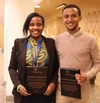Women can grow vegetables, earn an income, and gain savings and financial management skills
In Akoro village, Pallisa district in Eastern Uganda, a woman wakes up at 4 a.m. to cultivate her neighbour’s garden, a hoe in her hand and a child on her back. She returns home to prepare porridge for her children, then heads back to complete the job, and is paid either in cash or in millet. This is her daily routine, if she wishes to keep her children fed and in school.
Compelled to make a difference
Twenty-four-year-old Edith Violet Naisubi, a Mastercard Foundation Scholar at Ashesi University, grew up watching these women work long hours for little reward and even less ownership. As a business administration student, she felt compelled to make a difference and change the trajectory of their lives. Pairing up with a fellow Mastercard Foundation Scholar, 21-year-old Amanuel Eshete from Ethiopia, they created AgriSan, a community market garden where underprivileged women can grow vegetables, earn an income, and gain savings and financial management skills.
“An underprivileged woman in Pallisa is one who is illiterate, unemployed, and has no source of income. She is solely responsible for taking care of her family, yet she has no means or resources. Her daily struggles include providing food for her children, buying school supplies, and working in people’s gardens
One of Edith’s relatives donated a field for AgriSan to get started. The plot is large enough to accommodate 40 women. There, they are taught to prepare the land and plant, cultivate, and harvest fruits and vegetables such as tomatoes, onions, kale, watermelon, and other indigenous leafy greens. “The women will grow vegetables quarterly and target wholesale buyers like schools, restaurants, and traders,” said Amanuel.
To be eligible, interested women must register to have their living conditions assessed. Those in most need were selected to be part of the first group. To signal her commitment, each woman signs a declaration stating that she will invest the time necessary to make the garden a success and save a portion of the money she earns.
It is expected that after a one-year period, each woman will have saved enough to start producing her own vegetables and be ready to branch out.
Plans to diversify
“Our future plans are to diversify AgriSan as much as possible,” said Edith. “At first, we were only looking at vegetable farming, but now we are also looking at poultry farming and a training centre where these women can be trained in skills like tailoring, soap making, and hairdressing, among other things.”
Before the next group is selected, the team plans to buy 1.5 acres of land so they can accommodate more women.
The women get to keep 80 percent of the profit they earn, with 20 percent being retained by AgriSan for operational costs. In the near future, AgriSan wants to start providing start-up capital in the form of loans to women who complete the one-year program.
AgriSan won the 2019 Resolution Social Venture Challenge, a competition that rewards compelling leadership and promising social ventures led by youth. These young leaders and change-makers earned a fellowship that includes seed funding, mentorship, and access to a network of young global change-makers to pursue impactful projects in their communities. A collaboration between the Mastercard Foundation and The Resolution Project, the Resolution Social Venture Challenge provides a pathway to action for socially responsible young leaders who want to create change that matters in their communities.
Investing in development of young leaders and change-makers
“It feels so great to be an SVC winner and it has motivated me to take AgriSan to another level. Also, being part of the Resolution Fellowship is one of the things I was looking forward to achieving. This is because The Resolution Project cares not only for your venture, but also for your personal development as a leader and change-maker,” Edith elaborated. Amanuel shares the same sentiments and is happy to be part of a dream that has come true.
I am really happy that AgriSan is one of the SVC winners. This will aid in fostering our women’s empowerment program in Pallisa to take strategic positions on major development issues within the country. In addition, as part of the Resolution Fellowship, I believe the mentorship programs will give me the skills needed to be an entrepreneur and run a business.



